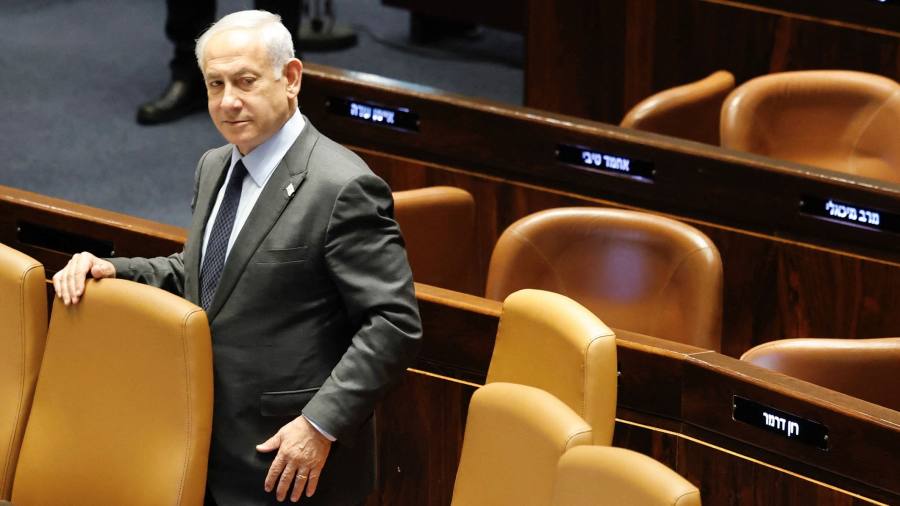
Benjamin Netanyahu has dominated Israeli politics for nearly two decades, outmanoeuvring his rivals with a combination of ruthlessness and skill to become the longest-serving premier in the country’s history.
But on Monday, the wily politician was forced to reverse course — at least temporarily — on the drive by his far-right government to overhaul the judiciary, after plunging the country into its biggest crisis in decades. Following months of protests, Netanyahu caved to public pressure after his decision to sack his defence minister for criticising the plan triggered a new wave of unrest and a general strike that threatened to paralyse the nation.
As news of the dismissal spread late on Sunday, tens of thousands of Israelis flooded the streets across the country to voice their anger. Israel was soon shutting down, as trade unions called on workers to down tools, sending the dissent rippling through the country’s institutions, with banks, embassies, ports and even Ben Gurion Airport suspending services.
Netanyahu finally agreed late on Monday to postpone the overhaul until the next parliamentary session, after keeping the country waiting for hours. Yet although the concession prompted the unions to call off the strike, demonstrations continued into Monday night, with organisers warning that they would continue until the changes were finally rejected.
“The State of Israel is injured and hurting,” opposition leader Yair Lapid said after Netanyahu’s partial climbdown. “We don’t need to put a plaster over the injuries but to treat them properly.”
The seeds of the crisis — dubbed by some the worst in Israel’s 75-year history — were sown after the parliamentary election in November, and swiftly became a battle for the soul of the Jewish state.
Netanyahu, battling corruption charges and shunned by mainstream former partners whom he had he alienated, and his ultraorthodox allies entered into an alliance with far-right groups, headed by the once-fringe ultranationalists Itamar Ben-Gvir and Bezalel Smotrich. The manoeuvring delivered a four-seat majority, returning the divisive Netanyahu to office after 18 months in opposition.
One issue that united the coalition, the most rightwing in Israeli history, was a burning desire to rein in the judiciary. A radical overhaul — that would give the government and its allies greater power over appointing judges and limit the ability of the top court to strike down legislation — became a priority.
Proponents argued that the changes were necessary to rein in an overly activist court that had used powers it was never formally granted to push a partisan leftwing agenda.
But critics viewed the overhaul as a fundamental threat to Israel’s checks and balances that would weaken minority protections, foster corruption and damage the economy.
Opposition to the plans brought hundreds of thousands of Israelis on to the streets to protest. Crucially, they also prompted thousands of military reservists to threaten that they would refuse to train.
It was this that led defence minister Yoav Gallant to issue the warning that got him sacked: that the polarisation generated by the planned overhaul posed a “clear, immediate and tangible threat” to Israel’s national security.
Some observers consider Netanyahu’s decision to let his government embark on such a radical path as part of an evolution under way since he was indicted on charges of bribery, fraud and breach of trust in 2020. Netanyahu has always denied the charges, dismissing them as a politically motivated witch-hunt.
After his indictment Netanyahu became “a lot more aggressive and belligerent vis-à-vis Israel’s judiciary and law and enforcement agencies,” said Yohanan Plesner, president of the Israel Democracy Institute, a think-tank. “He also increasingly allied himself to the most marginal and extreme elements of Israeli society.”
Others see the plan to ram radical changes through parliament within a few months of taking office as a miscalculation that underscores the extent to which Netanyahu’s partners — rather than he — control the government’s steering wheel.
“I don’t think he’s changed,” said Aviv Bushinsky, a former Netanyahu adviser turned political analyst. “Maybe he thought after this victory in the elections that he’s stronger than he is.”
Shalom Lipner, who worked under Netanyahu and is now a senior fellow at the Atlantic Council think-tank, said the prime minister had chosen to “ride the back of the tiger” by betting he could control Ben-Gvir and Smotrich.
But the upshot, he said, was that the far-right coalition, which has already fanned tensions with Palestinians in the occupied West Bank and soured ties with Israel’s neighbours, risked undermining Netanyahu’s legacy: stability, a booming economy and better relations with Arab countries that the veteran premier has long courted.
Despite the turmoil, and the coalition tensions laid bare in recent days, analysts said it was too early to write off the government, since neither Netanyahu nor his partners had better alternatives.
“The rightwing parties will hardly get another chance to have 64 [seats in Israel’s 120-seat parliament] in the near future. Netanyahu knows it, they should know it,” said Roni Rimon, a political consultant who ran the campaign that kick-started Netanyahu’s second term in 2009.
Plesner warned against underestimating Netanyahu, pointing out that the Likud leader was unlikely to face any challenges from within his own ranks “I’ve heard so many political eulogies for Netanyahu that it would be way too early to try and predict the end of his career,” he said.
While Plesner was certain that the judicial reform legislation “in the scope and the way they wanted to pass it is dead,” if the main components were retained in a subsequent push when parliament returned in May the fight would begin again.
“It would mean we’re not entering internal peace within Israeli society, but rather a one-and-a-half month ceasefire.”

